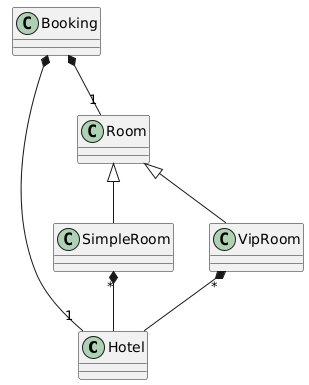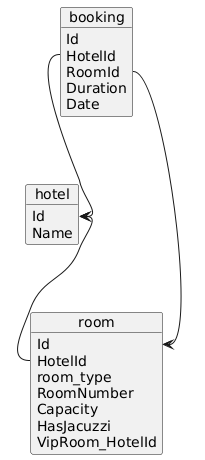Domain Model
Domain models are a crucial aspect of object-oriented programming, representing real-world entities and their relationships within a software system. They encapsulate both data and behavior, leading to more modular, maintainable, and reusable code.
It is important to understand that the primary focus of a domain model is not on data itself, but on the behavior that it operates on. A Domain Model unites functions that are most likely to be used together.
Comparing to Table Module pattern, Domain Model doesn't depend on the Database. It doesn't matter where and how the object will be saved.
In the long term, the code written with a Domain Model is easier to support and maintain compared to the Table Module pattern and especially Transaction Script.
Example
The DomainLayer has domain class models VipRoom and SimpleRoom, while the DataAccess layer saves both in the same table.
Domain Model schema

DB schema

Implementation
using DataAccessLayer;
using DomainLayer;
using Microsoft.Data.Sqlite;
using Microsoft.EntityFrameworkCore;
using PresentationLayer;
await new MainController().Main();
namespace PresentationLayer
{
public class MainController
{
public async Task Main()
{
using var dbContext = new AppDbContext();
var isCreated = await dbContext.Database.EnsureCreatedAsync();
var script = dbContext.Database.GenerateCreateScript();
await CreateHotelWithRoomsAndBookings();
await CancellAllBookigsInAllHotes();
}
private async Task CreateHotelWithRoomsAndBookings()
{
using var dbContext = new AppDbContext();
var hotel = new Hotel("Hotel1");
await dbContext.AddAsync(hotel);
await dbContext.SaveChangesAsync();
var vipRoom = new VipRoom(hotel, 1, 2, true);
var simpleRoom = new SimpleRoom(hotel, 2, 2);
await dbContext.AddAsync(vipRoom);
await dbContext.AddAsync(simpleRoom);
await dbContext.SaveChangesAsync();
var booking1 = new Booking(simpleRoom, hotel, DateTime.Now.AddDays(1), 2);
var booking2 = new Booking(vipRoom, hotel, DateTime.Now.AddDays(2), 3);
await dbContext.AddAsync(booking1);
await dbContext.AddAsync(booking2);
await dbContext.SaveChangesAsync();
}
private async Task CancellAllBookigsInAllHotes()
{
using var dbContext = new AppDbContext();
var allHotels = await dbContext.Hotels.Include(hotel=>hotel.Bookings).ToListAsync();
foreach (var hotel in allHotels)
{
hotel.CancellAllBookings();
}
dbContext.UpdateRange(allHotels);
await dbContext.SaveChangesAsync();
}
}
}
namespace DomainLayer
{
public class Hotel
{
public Hotel() { }
public Hotel(string name)
{
this.Id = Guid.NewGuid();
this.Name = name;
}
public Guid Id { get; set; }
public string Name { get; set; }
public virtual ICollection<VipRoom> VipRooms { get; set; } = [];
public virtual ICollection<SimpleRoom> SimpleRooms { get; set; } = [];
public virtual ICollection<Booking> Bookings { get; set; } = [];
public void AddBooking(Booking booking)
{
if (booking.Date < DateTime.Now)
{
throw new ArgumentException("Date must be in the future");
}
if (booking.Duration < 1)
{
throw new ArgumentException("Duration must be at least 1 day");
}
if (this.Bookings.Any(b => b.Date == booking.Date))
{
throw new ArgumentException("There is already a booking for this date");
}
this.Bookings.Add(booking);
}
public void CancellAllBookings()
{
this.Bookings.Clear();
}
}
public abstract class Room
{
public Room() { }
public Room(Hotel hotel, int roomNumber, int capacity)
{
this.Id = Guid.NewGuid();
this.Hotel = hotel;
this.RoomNumber = roomNumber;
this.Capacity = capacity;
}
public Guid Id { get; set; }
public int RoomNumber { get; set; }
public int Capacity { get; set; }
public virtual Hotel Hotel { get; set; }
}
public sealed class SimpleRoom : Room
{
public SimpleRoom() { }
public SimpleRoom(Hotel hotel, int roomNumber, int capacity) : base(hotel, roomNumber, capacity)
{
}
}
public sealed class VipRoom : Room
{
public VipRoom() { }
public VipRoom(Hotel hotel, int roomNumber, int capacity, bool hasJacuzzi) : base(hotel, roomNumber, capacity)
{
HasJacuzzi = hasJacuzzi;
}
public bool HasJacuzzi { get; set; }
}
public class Booking
{
public Booking() { }
public Booking(Room room, Hotel hotel, DateTime date, int duration)
{
if (duration < 1)
{
throw new ArgumentException("Duration must be at least 1 day");
}
if (date < DateTime.Now)
{
throw new ArgumentException("Date must be in the future");
}
this.Id = Guid.NewGuid();
this.Room = room;
this.Hotel = hotel;
this.Date = date;
this.Duration = duration;
}
public Guid Id { get; set; }
public DateTime Date { get; set; }
public int Duration { get; set; }
public virtual Room Room { get; set; }
public virtual Hotel Hotel { get; set; }
}
}
namespace DataAccessLayer
{
public class AppDbContext : DbContext
{
public DbSet<Hotel> Hotels { get; set; }
public DbSet<VipRoom> VipRooms { get; set; }
public DbSet<SimpleRoom> SimpleRooms { get; set; }
protected override void OnConfiguring(DbContextOptionsBuilder optionsBuilder)
{
var keepAliveConnection = new SqliteConnection("DataSource=myshareddb;mode=memory;cache=shared");
keepAliveConnection.Open();
optionsBuilder.UseSqlite(keepAliveConnection);
}
protected override void OnModelCreating(ModelBuilder modelBuilder)
{
// VipRoom and SimpleRoom are saved in the same table
const string roomType = "room_type";
modelBuilder.Entity<Hotel>()
.ToTable("hotel");
modelBuilder.Entity<Room>()
.ToTable("room");
modelBuilder.Entity<SimpleRoom>()
.HasDiscriminator<string>(roomType)
.HasValue<SimpleRoom>(typeof(SimpleRoom).ToString());
modelBuilder.Entity<VipRoom>()
.HasDiscriminator<string>(roomType)
.HasValue<VipRoom>(typeof(VipRoom).ToString());
modelBuilder.Entity<Booking>()
.ToTable("booking");
}
}
}
CREATE TABLE "hotel" (
"Id" TEXT NOT NULL CONSTRAINT "PK_hotel" PRIMARY KEY,
"Name" TEXT NOT NULL
);
CREATE TABLE "room" (
"Id" TEXT NOT NULL CONSTRAINT "PK_room" PRIMARY KEY,
"RoomNumber" INTEGER NOT NULL,
"Capacity" INTEGER NOT NULL,
"room_type" TEXT NOT NULL,
"HotelId" TEXT NULL,
"HasJacuzzi" INTEGER NULL,
"VipRoom_HotelId" TEXT NULL,
CONSTRAINT "FK_room_hotel_HotelId" FOREIGN KEY ("HotelId") REFERENCES "hotel" ("Id") ON DELETE CASCADE,
CONSTRAINT "FK_room_hotel_VipRoom_HotelId" FOREIGN KEY ("VipRoom_HotelId") REFERENCES "hotel" ("Id") ON DELETE CASCADE
);
CREATE TABLE "booking" (
"Id" TEXT NOT NULL CONSTRAINT "PK_booking" PRIMARY KEY,
"Date" TEXT NOT NULL,
"Duration" INTEGER NOT NULL,
"RoomId" TEXT NOT NULL,
"HotelId" TEXT NOT NULL,
CONSTRAINT "FK_booking_hotel_HotelId" FOREIGN KEY ("HotelId") REFERENCES "hotel" ("Id") ON DELETE CASCADE,
CONSTRAINT "FK_booking_room_RoomId" FOREIGN KEY ("RoomId") REFERENCES "room" ("Id") ON DELETE CASCADE
);
CREATE INDEX "IX_booking_HotelId" ON "booking" ("HotelId");
CREATE INDEX "IX_booking_RoomId" ON "booking" ("RoomId");
CREATE INDEX "IX_room_HotelId" ON "room" ("HotelId");
CREATE INDEX "IX_room_VipRoom_HotelId" ON "room" ("VipRoom_HotelId");